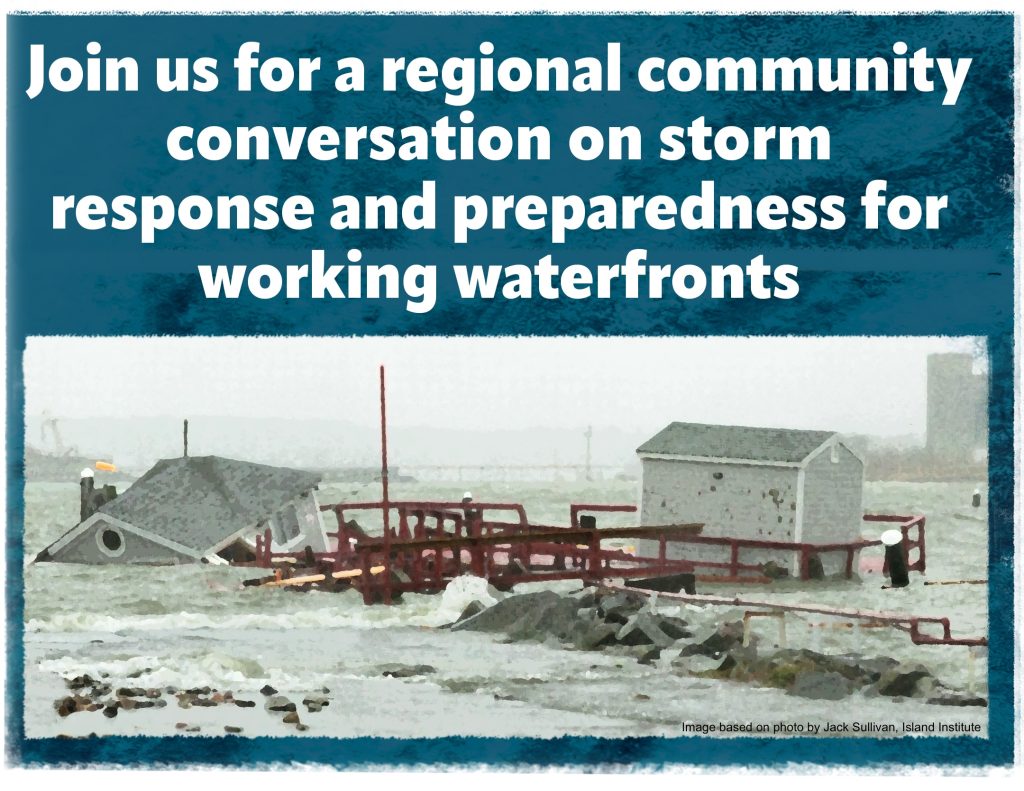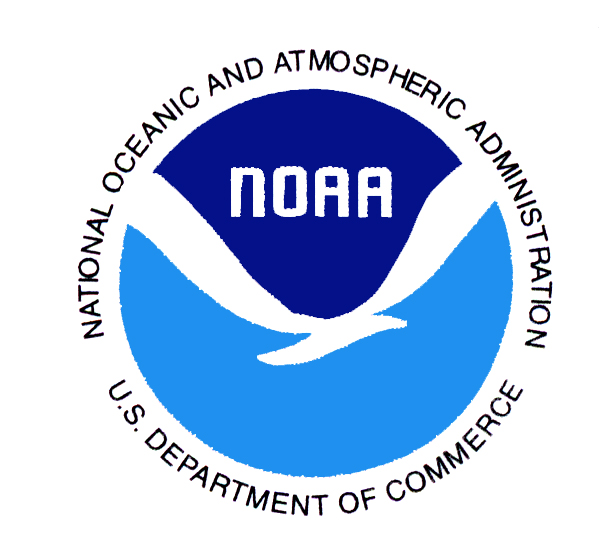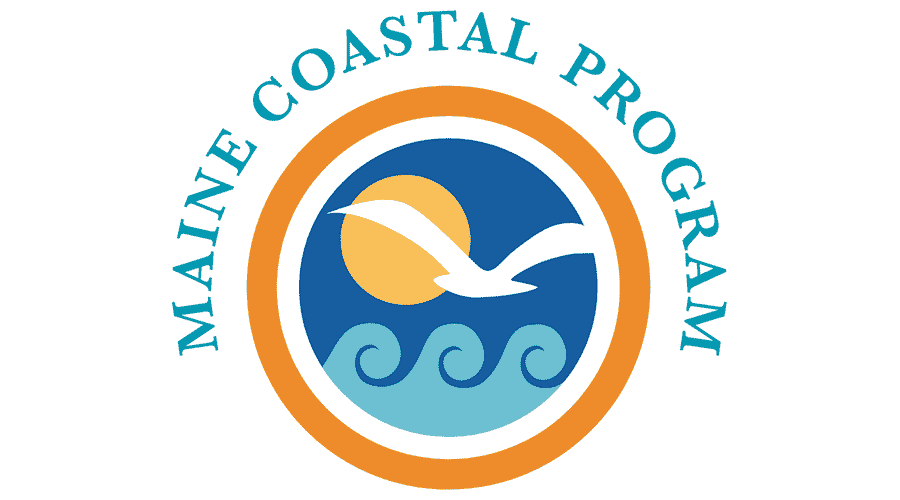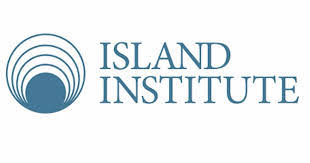Storm Response and Preparedness in Working Waterfront Communities
About the convenings
During the winter of 2023-2024, Maine experienced a series of destructive coastal storms that caused severe flooding, damaging homes, businesses, and other coastal and waterfront infrastructure throughout the state. People saw their communities turned upside down by the sea, with millions of dollars of damages, including many total losses of wharves, piers, docks, roadways, and water and sewer infrastructure, in addition to coastal homes and businesses. The impacts are ongoing, as people and institutions continue to grapple with how to rebuild, rethink, and prepare for future storms.
In the aftermath of the storms, the state’s working waterfront community members, emergency responders, the Governor’s office, state agencies, the legislature, and nonprofits, stepped into action with manual labor, short term funding, impact inventories, and more. The level of statewide and local activity related to working waterfronts and storm response was unprecedented. And yet, one important gap emerged: space for community members to come together and discuss what happened, how they responded, and how to prepare for the next storms.
To help address this need, Maine Sea Grant sought counsel from elsewhere in the National Sea Grant Network who had also faced acute natural hazard events in Alabama, North Carolina, Puerto Rico, New York, Connecticut, Guam and others. Sea Grant staff offered three kernels of advice to help Maine communities respond to and prepare for future storms: 1) Let the emergency responders do their job and support them when you can, 2) Create space for people to come together as a community to talk about how to respond and how to prepare, and 3) Stay in it for the long haul – needs don’t vanish overnight and it is valuable to continue to create space a year and longer after the event.
Creating space for local and regional conversations
Taking this advice, Maine Sea Grant applied for and received “Rapid Response Funding” from the NOAA Sea Grant Office in spring 2024, with a focus on the second recommendation from our Sea Grant colleagues: create space for people to come together and talk about how to respond and how to prepare. Maine Sea Grant and three partner organizations (Island Institute, UMaine MARINE & Maine Coastal Program) began seeking guidance from local networks, such as members of Maine’s Working Waterfront Coalition and members of the Maine Climate Council, industry leaders, state agency representatives, and non-government organizations, about how to achieve that goal. Approximately 60 people helped think through how local and regional-scale conversations across multiple sectors could help communities learn from each other and begin to implement regional solutions in anticipation of future storms.
The planning team also engaged on-the-ground leaders in towns, industries and organizations around the coast and worked with them to identify ten regions of the state to hold these convenings. Criteria included: local people who could help spread the word, a need expressed by local leaders for regional conversations, and (importantly) whether there were local efforts already underway, with which this would conflict or cause confusion. With more capacity and funding, this group would have been able to increase the number of these gatherings, and where those needs still exist, conversations are ongoing.
A snapshot of the series
The intent of this series was to create space for community members across diverse sectors to take stock of their working waterfronts and community resilience since the storms. People shared their experiences, responses, and actions in the moment of the storms and since, and how these actions fit into community resilience efforts underway. They learned about resources and identified gaps and needs in anticipation of future storms. Most importantly, they made connections that helped them feel better prepared.
Spanning coastal Maine from Kittery to eastern Washington County, these community conversations brought together selectboard members; municipal staff; town committee volunteers; water-dependent business owners such as fishermen, wharf owners, and boat builders; emergency response personnel; social services providers; Community Resilience Partnership volunteers & providers; and countless residents from 10 coastal Maine regions. Ultimately, 450 people with addresses in 83 municipalities were engaged in one or more of the conversations.
The statewide context: Maine Infrastructure Rebuilding and Resilience Commission
Concurrently, the State of Maine acted on many other fronts to bring capacity, funding, and policy analysis forward to address a broader scope of needs in the aftermath of the storms. In May 2024, Governor Mills established the Maine Infrastructure Rebuilding and Resilience Commission to analyze state policy priorities to address barriers to rebuilding and resilience.
With both efforts underway, an opportunity emerged for the Sea Grant-supported storm response convenings to identify regionally-specific needs and opportunities, while helping to inform the higher level policy analysis underway with the Commission. The Commission issued its preliminary recommendations in November 2024. Based on their recommendations, they, along with the Governor, supported bipartisan legislation, LD 1, An Act to Increase Storm Preparedness for Maine’s Communities, Homes and Infrastructure. This act aims to implement the Commission’s highest priority recommendations.
Documents related to the series
Between November 18, 2024, and February 11, 2025, 10 regional community conversations took place between Kittery and Eastern Washington County. These are the products of those conversations.

- Final Summary Notes and Key Takeaways: Summary document describing the full series, participation and methods for analyzing participant input, and presenting 17 major themes discussed both regionally and statewide.
- One page fact sheet (PDF format): Brief summary of key takeaways from the 10 convenings.
- Images included in the Summary document made available here for ease of viewing.
- Full series word cloud with relative weight of topics discussed statewide.
- Regional word clouds with relative weight of topics discussed for four regions (Southern Maine and Portland, Mid-Coast Maine, Hancock County, and Washington County).
- Series Map: Showing the 10 regions for the community conversations.
- Resources Document: This document was shared and updated during the series. It continues to be updated quarterly, and is intended to be used into the future.
- Meeting Notes from Each Convening:
- Southport/Boothbay/Boothbay Harbor/Bristol/South Bristol
- Phippsburg/Georgetown/Arrowsic
- Portland/South Portland/Casco Bay Islands
- Kittery
- Roque Bluffs/Machias/Machiasport/Whiting/Cutler/Trescott/Eastport/Lubec
- Jonesport/Addison/Beals
- Milbridge/Steuben/Harrington
- Mount Desert Island/Cranberry Isles/Trenton
- Blue Hill/Brooklin/Brooksville/Castine/Penobscot/Sedgwick/Surry
- Sullivan/Sorrento/Hancock/Gouldsboro/Winter Harbor
- Sea level rise projection map: Digital map showing statewide inundation scenarios for 3.9 ft and 8.8 ft of sea level rise.
Please reach out if you are interested in hearing an update about the series from members of the planning team. We have been presenting summaries to various groups and are happy to continue. For more information, please email katrina.armstrong@maine.edu.
Series Background

Storm Response and Preparedness in Working Waterfront Communities
Thank you for joining us for vital community conversations to enhance our response, preparedness and resilience in the face of increasing storm events.
Ten community convenings happened in fall 2024 and early winter 2025 throughout Maine’s coastal and working waterfront communities. The convenings explored how we can better respond to and prepare for storms like the ones that hit us in winter 2023/2024. Each convening was organized collaboratively with local leaders and contacts, and we are grateful for their help!
The goals of this effort are to:
- Create space for community members across diverse sectors to take stock of their working waterfronts within the context of the community’s resilience since the storms.
- Share resilience and working waterfront planning work across the region: recent, underway, or planned.
- Learn about resources for public and private working waterfront resilience.
- Identify systems and networks that would be useful to have in place locally to support working waterfronts in anticipation of future storms.
Our focus regions (see map here).
Please note there are no more conversations scheduled at this time.
- Southport/Boothbay/Boothbay Harbor/Bristol/South Bristol (November 18, 2024 5-7 PM, Coastal Rivers Land Trust, 3 Round Top Lane, Damariscotta)
- Phippsburg/Georgetown/Arrowsic (November 20, 2024 5-7 PM at The Grant Building, 31 Centre St. Bath)
- Portland/South Portland/Casco Bay Islands (December 3, 2024, 5-7 PM, Gulf of Maine Research Institute, 350 Commercial St, Portland)
- Kittery (December 5, 2024, 5-7 PM, Kittery Community Center, 120 Rogers Road, Kittery)
- Roque Bluffs/Machias/Machiasport/Whiting/Cutler/Trescott/Eastport/Lubec (December 10, 2024, 5-7 PM, Washington Academy, 66 Cutler Rd, East Machias)
- Jonesport/Addison/Beals (December 12, 2024, 5-7 PM, Peabody Library, 162 Main St., Jonesport)
- Milbridge/Steuben/Harrington (December 16, 2024, 5-7 PM, 5-7 PM, 49 Smithville Road, Steuben Fire Hall, Steuben)
- Mount Desert Island/Cranberry Isles/Trenton (January 27, 2025, 5:00 to 7:00 PM. Neighborhood House, 1 Kimball Rd, Northeast Harbor)
- Blue Hill/Brooklin/Brooksville/Castine/Penobscot/Sedgwick/Surry (January 29, 2025, 5:30-7:30 PM, Blue Hill Public Library, 5 Parker Point Rd, Blue Hill)
- Sullivan/Sorrento/Hancock/Gouldsboro/Winter Harbor (February 11, 2025, 5-7 PM, Charles M. Sumner Learning Campus, 2456 US Hwy. 1, Sullivan, ME 04664)
For more information, please email katrina.armstrong@maine.edu.
Maine Sea Grant, working in partnership with Maine Coastal Program, Island Institute and UMaine MARINE, received funding from the National Sea Grant office to plan these convenings in response to the January 2024 storms.







